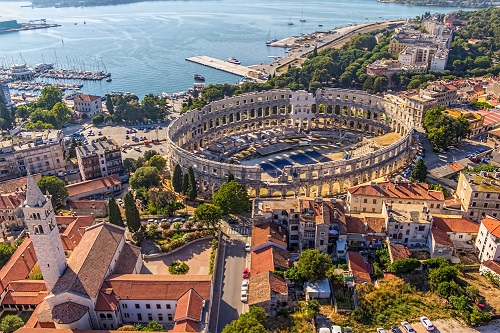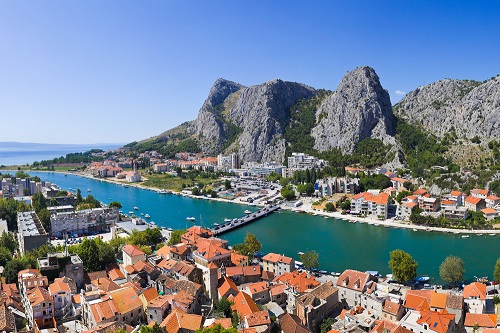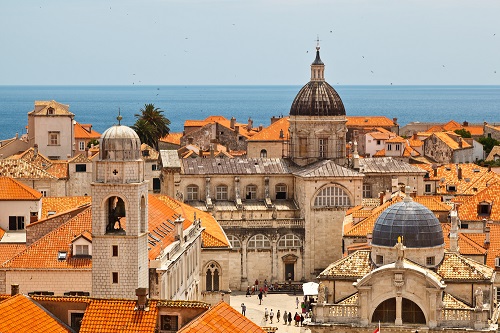Croatia has both a public and a private healthcare sector. If you are an expat and are working in the country, you will need to be registered with the national health insurance scheme, known as the HZZO.National health insurance is mandatory for everyone in Croatia. If you access the public system, therefore, you will be covered to some extent. However, you will need to make some co-pay costs, unless you have supplementary dopunsko insurance, in which case your treatment will often be free at the point of delivery.
State health insurance costs in Croatia
The World Health Organisation (WHO) reports that public spending on health per capita grew rapidly between 2000 and 2008 but started to decrease in 2009, due to the recession and repeated cuts to the health budget. Croatia experienced a fall in GDP between 2009 and 2014. The WHO says that over the course of the downturn, reductions in public spending on health focused on enhancing efficiency rather than shifting healthcare costs onto patients. It led to rising deficits for providers, who struggled to meet service costs with lower budgets.
The WHO also reports that poor fiscal management over the last 30 years has been a feature of public healthcare spending. HZZO and hospitals have consistently overspent their budgets and accumulated arrears, particularly when faced with budget cuts. As a result, the WHO says, there were 14 bailouts of HZZO or providers between 1994 and 2017. All of this leads to additional strain on the public healthcare sector.
The HZZO is mainly funded through payroll deductions, but around 8% of its revenue comes from the government budget, in order to cover some of the healthcare costs of non-contributing residents (vulnerable citizens are covered by the HZZO but do not necessarily contribute to it).

There are three main types of national coverage:
• Obavezno zdravstveno osiguranje – public basic health insurance
• Dopunsko zdravstveno osiguranje – public or private supplemental health insurance
• Dodatno zdravstveno osiguranje – private supplemental health insurance (usually offered by banks as well as insurance companies)
Premiums are currently around 530 Kn (approximately US$78) per month and are deducted from employees’ salaries.
If you are from outside the EU and are enrolling with the HZZO for the first time, you will need to make a one-off payment of 6356 Kn (around US$937), which is treated as a back payment for the previous year. So be prepared to pay quite a steep bill for your health insurance in your first year of residence in Croatia.
If you need to see a doctor, you will not have to pay very much – it costs around $1 for an appointment – but other primary care should be free at the point of delivery. You may need to make small co-payments for specialist appointments, but if you have supplementary dopunsko insurance, this can be negated.
For co-payments in secondary and tertiary care, you may need to pay 20% of the cost of outpatient services, with a minimum payment of 25 kunas ($3 to $4). The fixed co-payment per dentist visit is 10 Kn ($1). For inpatient care, you will be looking at 20% of the cost, with a minimum payment of 100 Kn ($13) per day of hospitalisation. Again, this can be reduced or removed altogether by dopunsko coverage.
How much does treatment cost in the private sector?
If you are visiting Croatia and need medical treatment, your first port of call will be a poliklinika – these are all in the private sector. Medical costs in the country are competitive in comparison to those in neighbouring EU nations, and Croatia is gradually making a name for itself in medical tourism, with the tourist authorities pushing some attractive packages.

Some sample costings are:
• Hip replacement: 53,000 Kn ($7600)
• Knee replacement: 53,000 Kn ($7600)
• Eyelid surgery: 7481 Kn ($1090)
• Facelift: 23,000 Kn to 53,000 Kn ($3280 to $7600), depending on the extent of the procedure
• Abdominoplasty (‘tummy tuck’): 16,000 Kn to 21,369 Kn ($2300 to $3000+)
Some sample dental costs are as follows:
• Descaling: 250 Kn ($38)
• Filling: 230 Kn to 315 Kn (approx. $33 to $45)
• Root canal: 350 Kn to 600 Kn (approx. $54 to $87)
• Dentures: 2000 Kn to 3000 Kn (approx. $295 to $450)
• Metal/ceramic crown: 1200Kn to 1500 Kn (approx. $177 to $218)
• Ceramic crown: 2500 Kn (approx. $400)
• Implant: 4800 Kn to 6500 Kn (approx.$700 to $960)
Some sample costs for optical surgery are as follows:
• Consultation for refractive surgery: 750 Kn ($107)
• Laser surgery: 4500 Kn to 9000 Kn ($645 to $1289) per eye, depending on the type of treatment
• Intraocular lens implant: 12,000 Kn to 15,000 Kn ($1720 to $2150)
• Cataract surgery: 9000 Kn to 19500 Kn ($645 to $2795), depending on type of treatment
Make sure that your chosen clinic accepts your insurance, and contact your insurance provider to check whether you need pre-approval for your procedure. Some Croatian clinics will allow you to pay in instalments if you are a resident of the country and have particular credit cards, but this option is not available for medical tourists. Some clinics will allow you to pay in cash.

